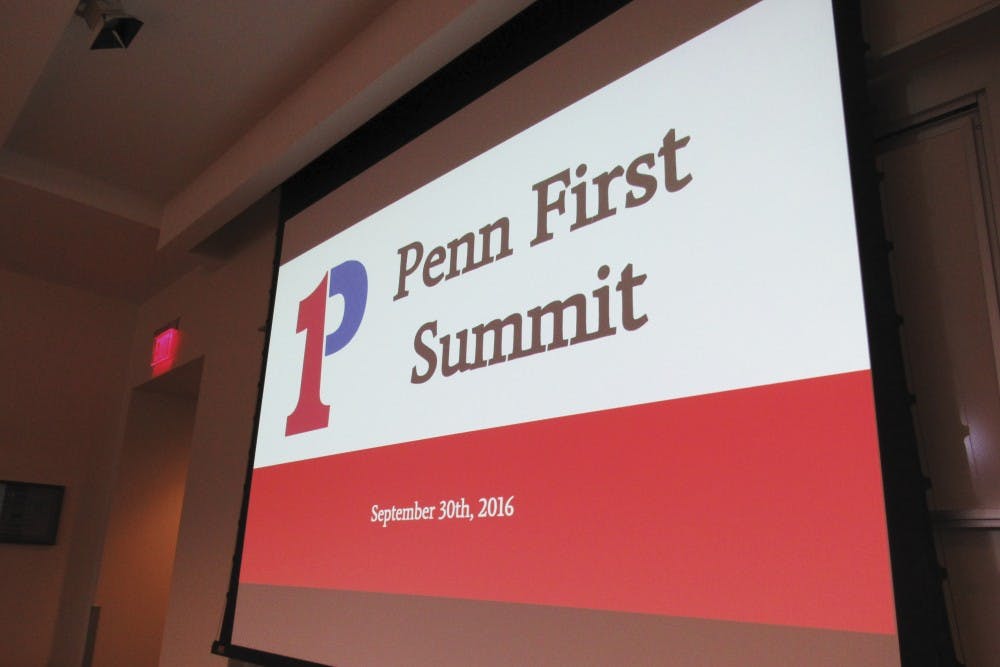Penn First, the student organization for first generation, low-income (FGLI) students on campus, held its second summit this weekend to plan its agenda for the rest of the semester.
Since its inaugural summit in April, Penn First has implemented a range of initiatives, including the establishment of a free textbook library for FGLI students housed in the Greenfield Intercultural Center and the creation of a position within the Student Financial Services advisory board for a Penn First representative.
“As board members, we’re always talking to the school administration but we don’t often get the opportunity to hear from the community in a structured manner,” said Wharton senior Seidy Pacheco, who is the financial chair of Penn First. The summit was an opportunity to give a voice to any and all FGLI students, she added.
The Saturday event, which began at noon, started with the 20 attendees breaking off into groups to discuss the issues they faced in their life at Penn. After an hour, the attendees came back together to discuss feasible steps that they could take to address their challenges.
College freshman Daniel Gonzalez said that the summit was the first time he felt engaged in a discussion about the FGLI student experience. He added that even though he is only a freshman, he had already observed certain issues on campus that disproportionately affect FGLI students. Examples include the need to foster FGLI students’ sense of belonging at Penn and an increase in their access to academic and post-graduate resources.
One of the actionable steps that Penn First will be campaigning for this semester is increasing the opening hours of resource centers like Student Financial Services and Counseling and Psychological Services. Currently, SFS is open from 9 a.m. to 5 p.m. on Monday through Friday, with the exception of Tuesday, when it opens at 10 a.m.; CAPS is open from 9 a.m. to 5 p.m. on Mondays, Tuesdays and Fridays, then from 9 a.m. to 7 p.m. on Wednesdays and Thursdays. Many FGLI students are not able to access these resource centers at these times because they spend the mornings and afternoons either attending lessons or working.
The issues raised during Saturday’s summit were more complicated to address than those raised at the previous summit in April, Pacheco said.
Right now, the immediate priority for the board is to prepare FGLI students for the changes that have been made to the Free Application for Federal Student Aid. Starting with the academic year of 2016-17, students will be able to submit a FAFSA as early as Oct. 1, 2016 rather than from the previous date of Jan. 1, 2017. On the FAFSA website, it states that the federal deadline of June 30, 2017 will not change, but that “some state and school deadlines” might be shifted earlier.
Federal student aid is the largest provider of student aid in the nation and many students at Penn are likely to be affected by these changes. FGLI students are particularly concerned because small changes to their financial aid plan can significantly affect their ability to return to school the following year.
“For some people here on campus, a couple thousand dollars isn’t a big deal,” Pacheco said. “But for people within our community, even a couple hundred dollars may determine whether we have a place to live or not.”
The changes to FAFSA are being rolled out on a national level. As such, students from Penn First are not yet sure how these changes will manifest within the University. Seeing as the opening date for federal aid has already passed, Penn First plans to reach out to administrators as soon as they can in order to clearly understand what implications the FAFSA changes have for students applying for financial aid.
“A lot of us settle these financial aid applications on our own,” said College senior Megan Brookens who also attended the summit. “When changes like these happen, and if they are not well communicated, we are left to figure it all our own. It causes a lot of stress.”









